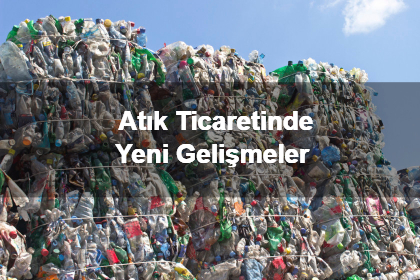
China to enforce new standards for foreign waste imports from March
China will enforce new standards governing imports of 11 types of foreign solid waste from 1 March 2018, the Ministry of Environmental Protection said on 11 January 2018.
The standards would include impurity thresholds of 1 percent for non-ferrous metal and just 0.5 percent for paper, ferrous metals and waste electric motors, the Bureau of International Recycling (BIR) explained in November 2017.
The move follows the Chinese decision to forbid the import by the end of 2017 of four classes of waste covering 24 kinds of solid wastes, including plastics waste, vanadium slag, unsorted waste paper and waste textile materials. The World Trade Organization‘s Committee on Technical Barriers to Trade circulated China‘s notice in July 2017.
News from the UK 1: Plastics exports rise to non-China destinations
Exporters of plastic waste for recycling have stepped up the volumes sent from the UK to Turkey, Taiwan, Vietnam and Malaysia, Michael Gove, Secretary of State for the Environment, has told Parliament.
And, Mr Gove has also cautioned against burning plastic for energy recovery as an alternative to recycling, saying that the waste hierarchy should be followed. In a detailed written answer on waste to Parliament, yesterday (8 March), Mr Gove – who kept his job in the Cabinet reshuffle – also said that there had been an increase in exports of paper to Turkey, Taiwan and Vietnam. He did not mention India although waste paper merchants have said that India is a destination for some material as is Cambodia.
Mr Gove told Parliament that “On 1 January 2018 China imposed a ban on the import of certain types of waste including mixed paper and post-consumer plastics (plastics thrown away by consumers). In addition, some other types of waste, including all other paper and plastics exports, will have to meet a reduced acceptable contamination level of 0.5% from March 2018.”
Reiterating comments by Defra last Friday, (see letsrecycle.com story), Mr Gove explained how ministers had been working to understand the potential impact of the ban and the action that needs to be taken. And, he said: “We have engaged internationally to understand the scale and scope of China’s waste restrictions. The UK Government raised the issue with the EU in September. Alongside four other members, the EU subsequently questioned the proposals at the WTO in October.”
In terms of UK handling of the material, he reminded operators that they “must continue to manage waste on their sites in accordance with the permit conditions issued by the Environment Agency. Where export markets or domestic reprocessing are not available, the process chosen to manage waste must be the one that minimises the environmental impact of treatment as fully as possible and follows the waste hierarchy.”
And, explaining what this means, Mr Gove said: “This requires operators to ensure that where waste cannot be prevented or reused it is recycled where practicable, before considering energy recovery through incineration or the last resort of disposal to landfill.”
In his statement, Mr Gove also said that “tackling waste has been a top priority for the government” and confirmed that a new Resources and Waste Strategy will be published “later this year”. He continued: “The Clean Growth Strategy, published on 12 October 2017, set out our ambition for zero avoidable waste by 2050 and announced we are exploring changes to the producer responsibility scheme. In December I chaired an industry roundtable on plastics and outlined my four point plan for tackling plastic waste: cutting the total amount of plastic in circulation; reducing the number of different plastics in use; improving the rate of recycling; supporting comprehensive and frequent rubbish and recycling collections, and making it easier for individuals to know what goes into the recycling bin and what goes into general rubbish.
“This builds on action the government has already taken to reduce waste. Our 5p charge on plastic bags has taken 9 billion bags out of circulation, reducing usage by 83%. On Tuesday 9 January, our world-leading ban on the manufacture of personal care products containing plastic microbeads comes into force. In October 2017 we announced a call for evidence on managing single use drinks containers and our working group will report to Ministers early this year.”
We are working with HMT on a call for evidence in 2018 seeking views on how the tax system or charges could reduce the amount of single use plastics waste. And under the Waste Infrastructure Delivery Program the government will have committed £3bn by 2042, supporting investment in a range of facilities to keep waste out of landfill and increase recycling levels.
“China’s decision underlines the need for progress in all these areas. In particular, we must reduce the amount of waste we produce overall and in particular the amount we export to be dealt with elsewhere. We will set out further steps in the coming weeks and months to achieve these goals, including in our forthcoming 25 Year Environment Plan.”
Source: Expra Newsletter

